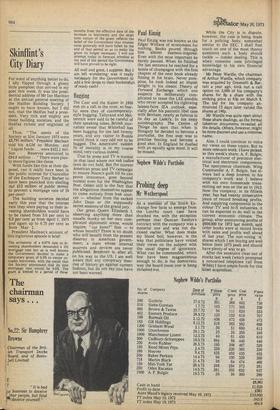Skinflint's City Diary
For want of anything better to do, I idly flipped through a glossy little pamphlet that arrived in my post this week. It was the presidential address of Mr Ian Maclean at the annual general meeting of the Halifax Building Society. I ought to have known, but I did not, that the Halifax had a president. Very rich and mighty are these building societies, and the Halifax richest and mightiest of all.
Thus, "The assets of the Society at 31st January 1973 were £2,791 million," President Maclean told his AGM on Monday, and . "Liquid funds ... were £421.1 million . . . Reserves amounted to £84.8 million ..." There were plenty more figures like these. With funds like this at their disposal, can it really have been in the public interest for Chancellor of the Exchequer Tony Barber to have been panicked into shelling out £15 million of public money to prevent a mortgage rate of 10 per cent? The building societies decided early this year that the interest rate they were paying to their in vesting shareholders would have to be raised from 5.6 per cent to 6.3 per cent as from April 1, 1973 and again up to 6.75 per cent as from May 1.
President Maclean's account of this inglorious episode is brief:
The arithmetic of a 6.67% rate to investing shareholders demanded a 104 mortgage rate but as is well known the Government decided to make a temporary grant of 0.5% to owner occupier borrowers, with the result that the Society announced that its new mortgage rate would be 9.5%. The grant is limited to a period of three months from the effective date of the increase to borrowers and the short term nature of the grant reflects the belief of the Government that interest rates generally will have fallen by the end of that period so as to make the grant no longer necessary. I will not attempt today to forecast whether at the end of the period the Government will have proved to be right.
All well and good, I suppose. But I am left wondering: was it really necessary for the Government to add a few drops to their bucketsful, of ready cash?
Bugging
The Czar and the Kaiser in 1809 met on a raft in the river, so fearful were they of contemporarystyle bugging. Tallyrand and Metternich were said to be careful of their speaking tubes. British jour nalists swear that Whitehall has been bugging for the last twenty years, and any visitor to Russia would think it very odd not to be bugged. The Americans' sudden fit of morality is to my coarse mind, very curious indeed.
Trial by press and TV is normal in that land where our sub judice ,laws do not hold. But the current.
American press and TV campaign to ensure Nixon's guilt till he can prove innocence, goes beyond
normal even for the Washington Post. Odder still is the fact that the allegations themselves appear
to come entirely from leak sources — whether from the sacked John Dean or the supposedly secret sessions of the grand jury. Our great Queen Elizabeth observing anything more than usually murky on her own com plicated diplomatic scene, would inquire: " cui bono?" first — to whose benefit? There is no doubt who will benefit from the present disarray in American government; a state whose internal quarrels and devices are never publicised. Breshnev is, after all, on his way to the US. I am well aware that any conspiracy theories of history go against current fashion, but do not say you have not been warned.
Paul Einzig
Paul Einzig was not known as the Edgar Wallace of economists for nothing. Books poured through him almost daemon-inspired. Even with the most important he barely paused. When he finished the last sentence he reached for a bottle of champagne with the first chapter of the next book already fizzing in his brain. Never pompous, he took indeed an impish delight in his classic Theory of Forward Exchange which one suspects he deliberately complicated to tease the LSE pundits who never accepted his rightwing laissez-faire IEA ,outlook, especially after his patriotic libel case. with Benham, nearly as famous in its day as Laski's. In his zesty autobiography The Centre of Things he says that when in Hungary he decided to become a journalist, the first step was to practise fencing and become a good shot. In England he duelled with an equally agile mind. It will be missed.


































 Previous page
Previous page